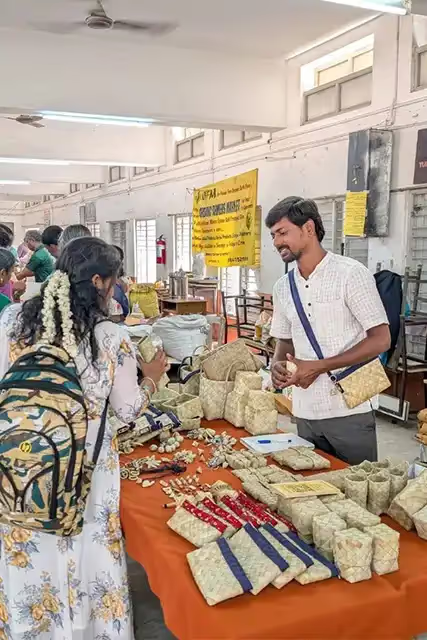Their efforts go beyond rejecting synthetic chemicals






Ten years ago, organic food was a niche phrase in the country’s vocabulary. Less than 1% of India’s agricultural land was sown for organic farming. By 2020, though, this number climbed to approximately 2% of India's 140.1 million hectares of net sown area. Slowly but certainly, the practice started to be discussed both in living rooms and in Parliament sessions. Many governmental programmes were introduced, bills were placed for policy consideration. But the transition to widespread adoption remains a challenge. Take the case of fertilisers, which prove to be both an essential necessity and cost to farming–both, conventional and organic farming.
For the financial year 2023-24, the government budgeted the total fertiliser subsidy at approximately Rs. 1.79 lakh crore. While chemical fertilisers receive substantial subsidies, natural or organic fertilisers do not receive similar privileges. Whether it’s about availing bank loans or getting fair compensation due to losses from natural calamities, organic farmers often get the short end of the stick.
A number of problems plague these farmers: a lack of subsidies, limited market accessibility, challenges in financing and a gap in policy implementation. But organic farming is important–not just to the environment, but to Indian farmers, too. Conventional agriculture hurts their soil and keeps their input costs at a constant high; moreover, organic produce can empower farmers to benefit from the premium prices that these products sell for.
So, what can organic farmers do about this?
The mission
In Tamil Nadu, there is a glimpse of the way forward. To address the challenges associated with organic farming and scale the practice altogether, a group of volunteers established a not-for-profit collective called the Tamil Nadu Iyarkai Velan Kootamaippu (TNIVK) in 2023. This collective, comprising civil society organisations, farmer producer groups, activists, seed conservators, and consumer organisations, is dedicated to mainstreaming organic farming in Tamil Nadu through government initiatives.
Their efforts go beyond merely rejecting synthetic chemicals. In its one-and-a-half years of operation, the TNIVK has organised monthly organic markets in Chennai and Madurai, supported organic farmers affected by cyclone Fengal through crowdfunding and even conducted a one-month travel-based program to raise awareness among younger citizens about the seven agro-ecological landscapes in the state.

Tamil Nadu ranks 14th in organic production across India with a total output of 24,826 metric tons, which includes both farm and wild produce. For context, Madhya Pradesh produces the highest organically farmed produce in the country. In the year 2020–2021, Tamil Nadu exported 4,223 metric tons of organic products and generated a revenue of ₹108 crore. While there are clearly individual efforts across the state, there is a dire need to bring them all under a singular umbrella. That serves as the TNIVK’s mission. "Through our collective, we aim to bring together the decades of effort that has shaped the state's organic farming movement,” explains G Karthik, coordinator of the TNIVK.
Another hurdle is within the produce market. A significant portion of buyers still expects organic products to be priced similarly to conventional food items. Farmers relent, but the problem is that middlemen often end up reaping substantial profits in the process. “To address this issue and directly connect organic farmers with consumers, the government should designate public spaces, such as government school premises, to conduct Sunday markets in every district. Additionally, dedicated spaces should be allocated in Uzhavar Sandhais (farmers markets) for organic farmers to sell their produce,” suggests R Vetrimaran, a Dindigul-based organic farmer.

Watch: A beginner’s guide to growing organic food
Need for government participation
Perhaps one of the most significant aspects of the support that the TNIVK is rallying for, is alleviating the organic farmers’ financial problems. A study that looked at Wayanad’s organic farmers found that fluctuations in interest rates and the inadequacy of conventional financial support mechanisms are holding them back significantly.
The state government, alongside civil society and the private sector, can play a pivotal role in driving this transition through policies and effective implementation. "The organic farming movement in the state has stagnated now. Involving the government is necessary to push the upscale," states G Ananthoo, founder of the TNIVK.
Introducing traditional rice varieties and replacing palm oil with native oils like coconut oil in the breakfast and lunch schemes for children will ensure nutritional security.
Tamil Nadu recently launched the Organic Farming Policy, 2023 to promote chemical-free agriculture, a step that is meant to acknowledge the collective efforts of numerous organisations and individuals. However, the policy has been facing the heat from the organic farmer community. “The policy did not commit to any fixed targets,” explains Karthik, outlining one of the more significant concerns with the policy. “There is no action plan, no timeline and no vision.” While the state wants to focus on chemical-free agriculture, the policy does not reflect it adequately. “One of the biggest demands that the genetically modified seeds should be banned in the state was not incorporated in it either,” Karthik adds.
The collective is also urging the state government to procure millets and traditional rice for inclusion in school breakfast and lunch schemes. "The Tamil Nadu government is the largest provider of food in the state through the Public Distribution System (PDS), the Integrated Child Development Scheme (ICDS), breakfast and lunch schemes for children, and nutritional food kits for pregnant women,” says Karthik. By procuring 30% of its food essentials from organic farmers, as suggested by the collective, the government can open up the market for these farmers but not just that: it can successfully align with the state’s goal of providing safe food to its citizens–including children.
“Introducing traditional rice varieties and replacing palm oil with native oils like coconut oil in the breakfast and lunch schemes for children will ensure nutritional security,” Ananthoo says. Another one of the collective's goals is to integrate a curriculum on organic food in educational institutions that educates children about conscious eating and the disadvantages of processed foods.
Also read: Kerala collective leads the charge in organic rice farming
‘Include organic farming in the budget’
In the past year, the TNIVK has held multiple state level consultative meetings–along with their discussions, they collected powerful suggestions from 500 farmers, including: a scheme to establish community seed banks for traditional seeds, provide infrastructural subsidies to enhance access to organic input shops, and periodically incentivise organic farmers to deliver ecosystem services. The TNIVK then formed a drafting committee comprising organic farming experts. On January 6, the final recommendations were submitted to the chief secretary N Muruganandam, agricultural minister MRK Paneerselvam as well as the members of the agricultural department, seeking to incorporate it into the agricultural budget. The recommendations ranged from demanding a place in the agricultural budget to addressing water management and farm mechanisation. The final budget is awaited.
“The agricultural budget is not a unilateral exercise; inputs from organic farmers will also be incorporated into the final plan. Organic farming is gaining traction in the state, driven by community efforts such as TNIVK,” promises G Prakash, Principal Secretary to Government.
Organic farming aids in reducing carbon emissions, conserving biodiversity and enhancing soil sequestration. However, while chemical fertilisers receive substantial subsidies, natural fertilisers receive none.
TNIVK recommends that 30% of the total agricultural budget should be allocated to organic farming programs. This is a substantial increase from the previous year's allocation, which was less than 0.05% of the total agriculture budget. But consider that organic farming incurs higher costs at every stage. For instance, while conventional farmers use weedicides costing less than Rs 1,000 for three applications, organic farmers rely on manual labour, spending at least Rs 2,500 for a single day in the field on a 25-cent plot of land. “Using weedicides harms the soil. Aren’t we providing ecological services by avoiding them?” questioned R Vetrimaran.
“Organic farming aids in reducing carbon emissions, conserving biodiversity and enhancing soil sequestration. However, while chemical fertilisers receive substantial subsidies, natural fertilisers receive none,” says Jalakanteswar, an organic farmer from Ranipet.
Certain government schemes and subsidies provide in-kind support, such as seeds, but these may not align with the exact needs of organic farmers. “For organic farmers, this support is of no use. Such policies need to be changed promptly,” Ananthoo says.
{{quiz}}
Explore other topics
References






.avif)

.png)


